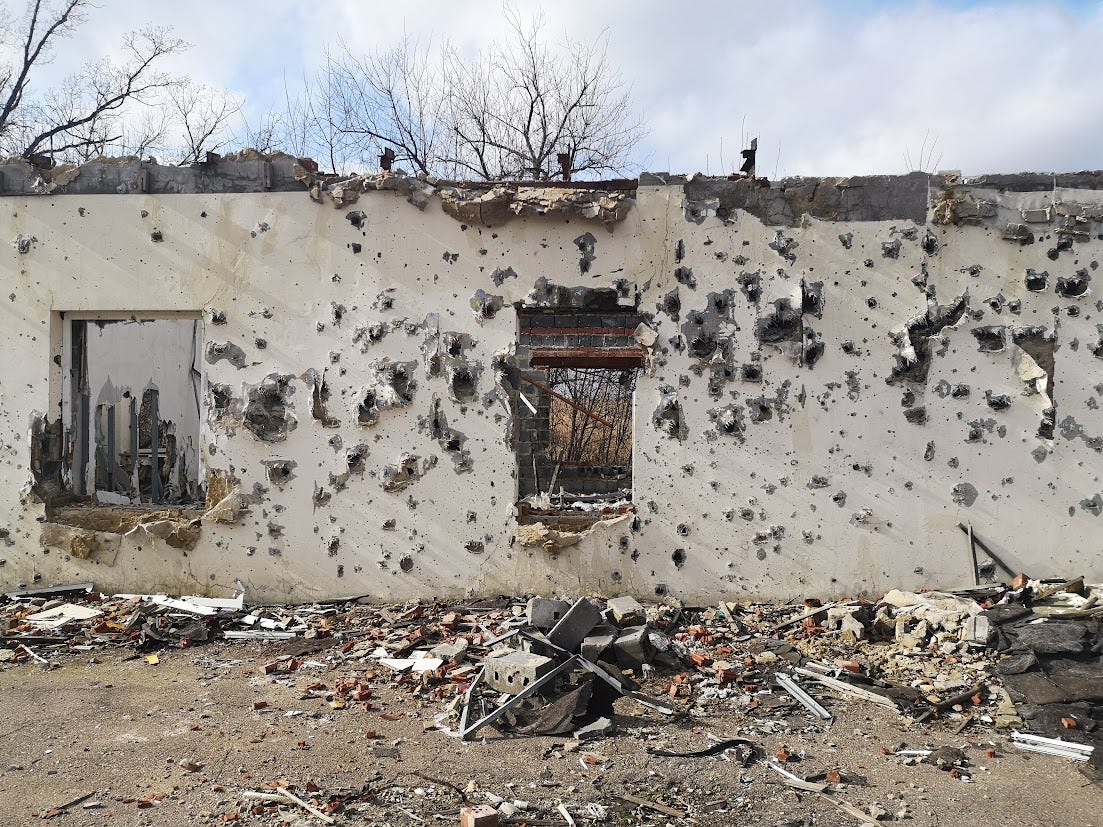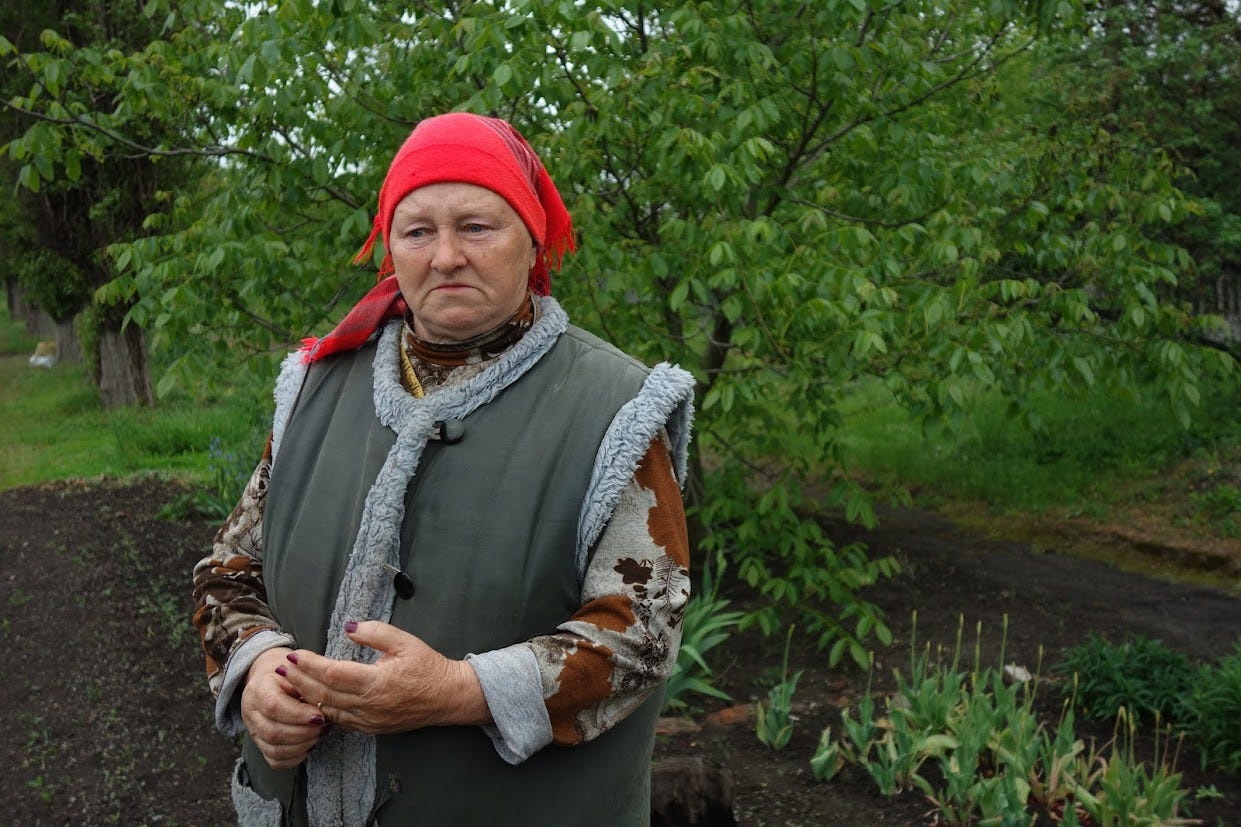MYKOLAIV—Earlier this week, Russian forces reached the first houses of Karlivka, a village 15 kilometers west of Donetsk.
I went to Karlivka for the last time in May 2022. Fighting was at the time eleven or twelve kilometers away and, for the following two years, I periodically checked that specific part of the frontline on the Deep State map, anticipating the moment when Russian forces would reach the town. But the defensive line erected by Ukrainian forces on the outskirts of Donetsk back in 2015 held and, for two years, the frontline ahead of Karlivka barely moved. That only changed in February, when Russian troops razed and finally conquered Avdiivka. Only then did they start making progress towards Karlivka.
I visited Karlivka twice before the February 2022 invasion. I thought it was a sad yet fascinating place, a place the war had deracinated and dropped in an entirely different space. Until 2013, Karlivka lived as a peaceful village defined by its proximity to the industrious city of Donetsk. There were spacious dachas and a sanatorium on the lakefront that became, in the spring and the summer, a popular resort for the city dwellers. There was a small hotel built in the village’s center, along the road that ran from Donetsk and through Karlivka—“escape the noise and the mess of the city, breathe some fresh air, come enjoy the setting sun far from the skyscrapers of Donetsk” it advertised at the time. The village’s 400 or so inhabitants could easily visit their relatives in the city, just half an hour's drive away. They didn’t even need a car, with regular marshrutkas making the connection between the village and the regional capital. Karlivka was small, but it wasn’t isolated.
Then the war started and, after months of fighting that left the village’s gas station and sanatorium in charred ruins, Karlivka found itself in the middle of nowhere. The frontline had severed the village’s connection to Donetsk, with trips to the city (now under the control of Russia-appointed separatists) requiring grueling journeys that could take days and, in the years before 2022, became near impossible. In May 2022, Olga, a fearful pensioner, talked about not seeing her daughter for the past 4 years, despite her living just 15 kilometers away. All public transport stopped as well, forcing anyone without a car to use taxis they usually couldn’t afford whenever they needed to go out of the village. The closest city became Pokrovsk: nearly 40 kilometers west, an unimpressive town of barely 60,000 inhabitants that very much paled in comparison to what had been the dynamic, lively city of Donetsk.
The young and those who needed to find work somewhere left. Others arrived, soldiers and activists for whom Karlivka’s position (not on the frontline, but not far from it either) made it a practical base. There were from that moment two worlds in Karlivka that lived side-by-side but rarely meddled.
Most locals lived in the houses south of the road. A medical unit of the ultranationalist Right Sector group had taken over an empty house on the northern side, next to the dilapidated sanatorium. A couple of meters down a path of overgrown weeds, also close to the lake, a group of enthusiastic activists had set up a free dental cabinet in an abandoned two-story house. Trizub Dental (there’s a pun here—Trizub (“Trident”) is the nickname of Ukraine’s coat of arms, while “zub” means tooth in Ukrainian) was an impressive operation, with state-of-the-art equipment (including two ambulances fully equipped for dental care and surgeries) and highly experienced dental surgeons who came from all over Ukraine for rotations that lasted a few weeks. Soldiers came from trenches and bases all over the frontline, with everything from benign toothaches to massive damage—in one case, a 22 years-old soldier’s teeth had been entirely shattered when the armored personnel carrier he was riding in drove over a pothole and the wooden butt of his AK rifle, which he was holding between his legs, rammed into his mouth.
Taped to the door leading into the house was a humid sheet of paper slipped into a plastic cover: “Attention !” it said in faded black letters, “There is a working dental cabinet for local civilians in the village of Halytsynivka”. Trizub Dental was for soldiers, and the group did not really want to treat local people that many soldiers and volunteers suspected of having separatist or pro-Russian sympathies (I know the word “separatist” seems a ridiculous term these days, but it was very much used by the time, including by Ukrainian soldiers). “They [the soldiers] don’t talk to civilians, you never know who they support, who they know on the other side of the frontline” one military chaplain told me in 2019. We were standing next to the church overlooking the lake (actually a reservoir), just after the checkpoint guarding the small dam that marked the entrance to Karlivka.
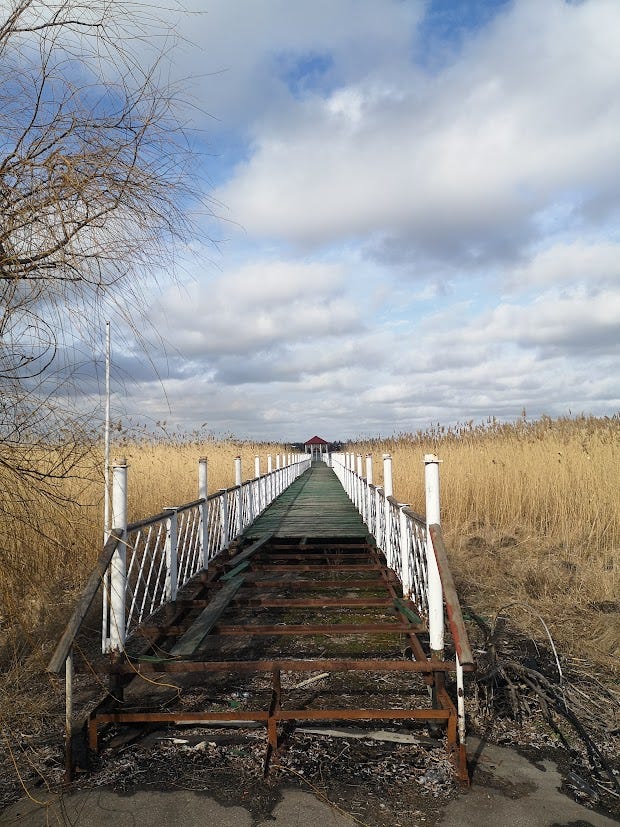
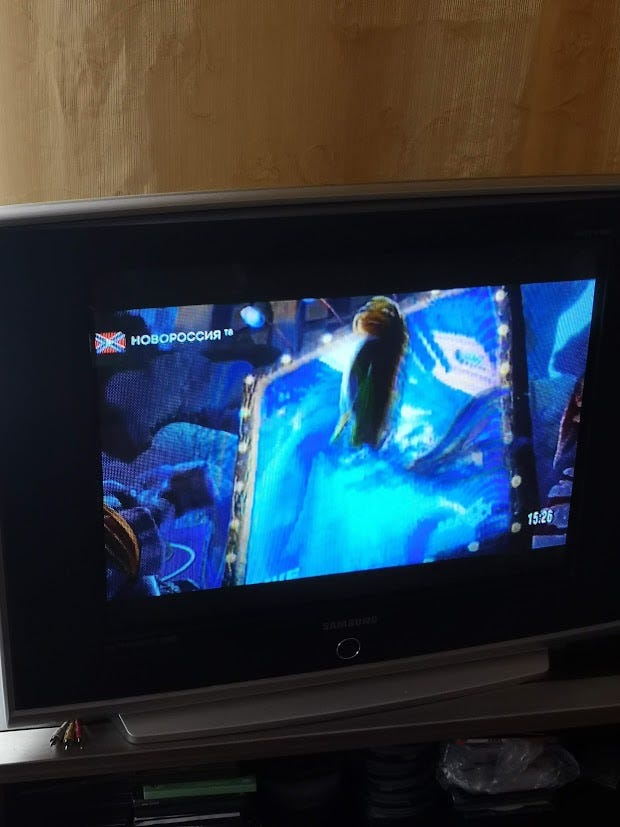
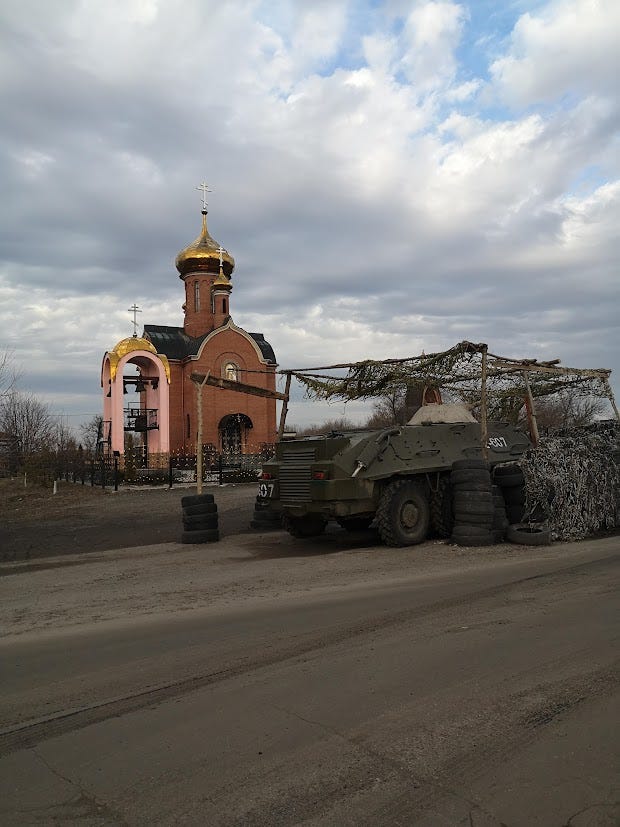
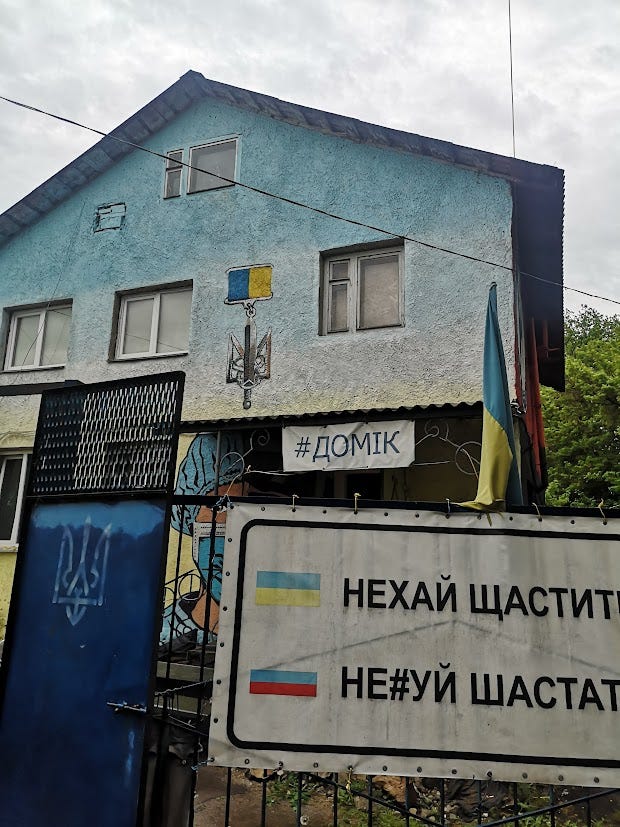
Being so close to Donetsk, there was of course nothing more common than for someone living in Karlivka to have relatives in the former regional capital. As for sympathies… it’s fair to say that there were in the village many people with views about the war and Russia that wouldn’t exactly fly in Kyiv. I heard about a villager whose son had died fighting for the separatists. Another woman once invited me inside her house for tea—the TV was on in her living room, showing a Pixar movie broadcasted by “Novorossiya TV”, a TV channel set up on the other side of the frontline by the Russia-backed separatist statelet. One woman praised Ukrainian soldiers, thanks to whom the village was safe from crime, she said. Another was more tight-lipped: “we don’t bother them and they don’t bother us”.
In May 2022, when the roar of artillery was still distant but already near-constant, I met a couple of pensioners who had arrived in the village just a few years ago. They fled Donetsk after it had been taken over by the Russia-appointed separatists, and were prepared to flee again rather than to live under Russian occupation. Others repeated they wouldn’t move no matter what. “I was born here and I’ll die here” cried yet another woman, speaking (like most people in the Donbas countryside) a mix of Ukrainian and Russian. Before and still after the Russian invasion, views about the war were messy, dominated by exhaustion, by the isolation the war had brought upon the village and by the feeling of abandonment this isolation had fueled.
None of this really matters now, for Karlivka at least. There’s a small river separating the first houses of the village, where Russian troops have already gained a foothold, from the rest of the village. It seems like a logical place to put a defensive line, so Russian forces may not enter Karlivka proper for some time. But, after ten years of war, the people of Karlivka are now on the ‘zero line’. It is already being bombed and is going to be devastated. Those who refused to leave will be killed, and those who survived will remain scarred beyond belief.
Something to read
AIN (in Ukrainian) | Car mobilization: how many were commandeered, and how many “gifted” to relatives? | May 24
Ukrainian outlet AIN dives into the little-covered topic of vehicle commandeering in Ukraine, as the new law on mobilization allows the military to seize civilian cars from any citizen who owns more than one car. This seems to be, for now, a very niche phenomenon: a military spokesperson claimed in May that just 2,000 civilian vehicles had been commandeered since the beginning of the Russian invasion, most of them back in 2022 and most of them taken from drivers arrested for drunk driving or involved in criminal activities.
But if commandeering remains a rare occurrence, the fear of it is apparently widespread: in April, Ukraine’s Interior Ministry reported more than 124,000 sales and purchase agreements for used cars, the highest monthly figure in ten years. “Market researchers believe that the jump was caused by people re-registering vehicles to relatives and friends if they own more than one car” AIN writes.
Courthouse News Service | Ukraine is ground zero in battle for ecocide law | June 5
A short but insightful piece on yet another way the Russo-Ukrainian war is changing things way beyond the border of either Ukraine or Russia, as Ukrainian prosecutors lead the charge to introduce the concept of ecocide in international justice.
[Ukraine] is one of only ten in the world that criminalizes ecocide, or the committing of intentional acts to destroy the environment. The term was coined during the Vietnam War, when the United States used chemical defoliants to strip jungle foliage and prevent the Viet Cong from using densely packed forests as shelter. Activists tried to get the crime added as the fifth international crime — alongside war crimes, genocide, crimes against humanity and the crime of aggression — when the Rome Statute was negotiated in 1998. Those attempts couldn’t overcome objections by the United Kingdom, France and the United States.
Soniakh | Surzhyk: A Transparent Double Mask | June 7
Three years ago on this same newsletter, I made the argument that surzhyk, this mix of Ukrainian and Russian spoken in the countryside of central, southern and eastern Ukraine, was the language facing the most discrimination in the country (the woman I mentioned speaking surzhyk in this January 2021 newsletter is the same I described inviting me in for tea in this issue, by the way). I was being somewhat provocative, as my knowledge of the topic was and still is very limited, making me all the more glad to come across this eloquent and thought-provoking reflection on the place of surzhyk in Ukraine, based on the author’s own experience.
The pre-war times were the years of my childhood—growing up in the village, I exclusively spoke Surzhyk until I was 17. I also always knew that when my family and I would visit nearby Donetsk, people there would be mostly speaking Russian. I have a strong recurring memory of this when I was at primary school. Each year, before the start of a school year, my family drove to Donetsk to buy me a school uniform. We always went to the same block in the same shopping mall and as soon as we were entering the clothing store, and my mum would ask questions about my preferences, and I would try to answer with a word which sounded identical in both Ukrainian and Russian so that nobody would realise that I was ‘a stupid uneducated villager’. Inevitably, the woman in the store would ask me more and more questions and as soon as she heard me speaking, I would die of shame as she began ‘smirking, whispering, patronising, cozening’ [11] in Russian to both me and my mum.
[...]
In 2022, Russia’s full-scale war against Ukraine started. [...] Having self-repressed for so long, I remembered that Russian was never my native language. I had not even spoken Russian until I was 17. There and then, I stopped, and have spoken Ukrainian ever since.
A year later, in March 2023, the war still continued, but by that time I noticed that my transparent mask was actually still on. I had taken off one mask, but I had failed to notice there were actually two of them. Being abandoned by my own parent, I was blindly begging it to accept and recognise me; I was telling everyone that Ukrainian was my only native language. I was told that Surzhyk did not exist as a proper language, and I believed it the same way as I believed that I was not the ‘right’ Ukrainian if I did not speak the perfect Ukrainian language.
ICYMI
Stories from legacy Western media published over the past few days
The Wall Street Journal / Like Russia, Ukraine Is Now Recruiting Soldiers From Prisons
Bloomberg / Putin Is Running Out of Time to Achieve Breakthrough in Ukraine
The New York Times / Energy Drinks Boost Ukraine’s Soldiers, and Its Economy
Bloomberg / Faster, cheaper and reliable: how Ukraine war fuelled demand for South Korean weapons
The Guardian / Ukrainian author turned soldier Oleksandr Mykhed: ‘This is not Putin’s war. This is a war waged by the whole Russian nation’
If this newsletter has been useful to you, please support my work by upgrading to a paid subscription, making a one-time donation or encouraging your friends and colleagues to sign up. I try hard to make this letter as interesting as possible, and I very much need your support. Thank you.





